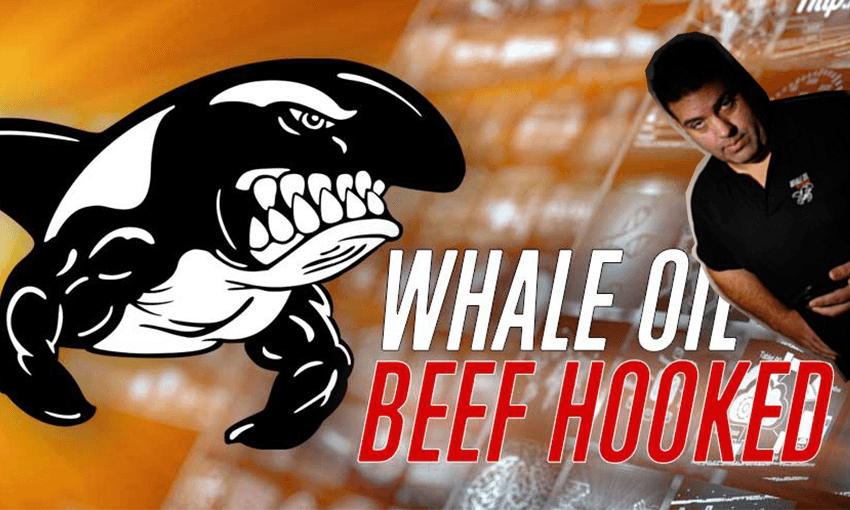The most notorious publication of the digital media era in New Zealand has closed down for good. Alex Braae writes the obituary to Whaleoil.
It is customary to say kind words about a person or entity when they leave this world forever. So what then can one say about Whaleoil, the blog which in 2014 described a victim of a car crash as a “feral”?
The project first started by Cameron Slater, which came to take on an outsize influence over New Zealand’s media and politics, has finally closed down. Slater himself is unwell after suffering a stroke, reportedly brought on by the stress of being sued by people he defamed in exchange for money.
Those who took over Whaleoil in his absence have wrapped it up. In the final post on the site, author SB (Slater’s wife, Juana Atkins) said that the community that was built around Whaleoil had now outgrown the original concept, and so it was now time to move on to a new venture. That has come in the form of TheBFD, a new platform which bills itself as “brash, focused and dedicated”. Whether or not it will live up to the more commonly understood meaning of the acronym remains to be seen.
Whaleoil was the focal point for a wider network of rightwing blogs, particularly during the heyday of political blogging over the late 2000s and early 2010s. It was the wilder, more aggressive outlet for talking points and political attacks from the right, in contrast to the more sober older brother-type role played by the still operational Kiwiblog, created by National aligned pollster David Farrar.
Slater’s writing style, like the political attacks it underpinned, was brutal and deliberately nasty. In 2014, Massey University awarded a line from Slater as their Quote of the Year, for saying “I play politics like Fijians play rugby. My role is smashing your face into the ground.”
His method, detailed in Nicky Hager’s book Dirty Politics, was in effect to use Whaleoil as a conduit for scandals to be seeded, so that they could subsequently be reported on in more mainstream publications. This made him an influential and useful contact for journalists to have, for two-way sharing of information. Slater’s work was also helped by his connections to a faction of the National party centred around Judith Collins.
At the time of its death, Whaleoil’s “about” page described itself as “the fastest-growing media organisation in New Zealand,” which was a bold claim given the decline of the platform’s influence following the release of Hager’s book. In Juana Atkins’s last post, she referred to “two works of fiction” published about the site, one of which was presumably Dirty Politics. The other would presumably be the recently released book Whale Oil by Margie Thomson, which covered the long-running legal battle between Slater and businessman Matthew Blomfield.
But in the past there was significant truth to that boast about Whaleoil’s rapid growth: it was true both of Slater’s readership and his own increasing political power. At times the site had hundreds of thousands of hits each month. On the back of the success of the blog, Slater himself used to make regular appearances in the mainstream media as a political commentator. He also won a Canon Media Award in 2014 for blogger of the year, and was listed on the Sporting Contacts site as a celebrity speaker for hire.
And his work really did signal a change in how political communication took place in New Zealand. It fitted into a brief window in which political blogs were important platforms, in between the decline of traditional media sources and the growth of social media as a way for politicians to reach their supporters directly.
After Dirty Politics, the role of Slater himself within the wider Whaleoil platform slowly diminished. Legal battles also took up much of his time, and a new cast of bloggers and commentators started to take over day to day writing for the site. Whaleoil began to have the unmistakable vibe of a platform where the tips had started to dry up; increasingly, it commented on already existing information, rather than bringing new information into the public domain. Even among other blogs, it appeared to be largely irrelevant, and was almost never cited or linked to. Other Slater ventures, including the $35 a month Incite newsletter, didn’t capture the imagination of the politics-watching public.
TheBFD looks set to continue the editorial direction of Whaleoil, leading this morning with regular features like “Face of the Day”, a post highlighting a negative Newshub story about the PM’s alleged refusal to answer questions about Ihumātao, and an opinion piece accusing the Green Party of “promoting racial division”. It seems to be going hard on the identity politics that have always been a major element of Whaleoil’s output, both as a framework for its writing, and as a concept to attack. In its latter years Whaleoil also leaned heavily into the more conspiratorial, nativist and hard-right sort of politics promoted by the likes of Lauren Southern, Paul Joseph Watson and Alex Jones.
It would be a surprise to see TheBFD ascend to the heights achieved by Whaleoil. Partly that is because the format of political blogging has fallen away in importance, and partly that is because the people around the platform now appear to have little influence among more mainstream organisations.
So farewell Whaleoil.net.nz. If it is to be remembered for anything, let it be for making politics a crueler, and more viscerally hateful arena. May we never see its like again.

